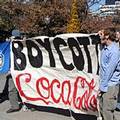 美國學生環保團體及人權團體抵制可口可樂獲得勝利!因可口可樂公司哥倫比亞廠與印度廠的營運衍生環保與人權爭議,密西根大學決定終止與可口可樂公司的商業關係。此事緣於可口可樂公司拒絕由第三方進行哥倫比亞廠的勞動檢查,而針對印度廠的環保問題,也未設立相應的審查機制與流程。此項決定自今年元旦起生效,讓可口可樂每年損失13筆總值達140萬美元的合約。
美國學生環保團體及人權團體抵制可口可樂獲得勝利!因可口可樂公司哥倫比亞廠與印度廠的營運衍生環保與人權爭議,密西根大學決定終止與可口可樂公司的商業關係。此事緣於可口可樂公司拒絕由第三方進行哥倫比亞廠的勞動檢查,而針對印度廠的環保問題,也未設立相應的審查機制與流程。此項決定自今年元旦起生效,讓可口可樂每年損失13筆總值達140萬美元的合約。
密西根大學校方表示,如果此事能獲得解決,他們還是會再繼續採購可口可樂的產品。目前,校園內有販售可口可樂的自動販賣機,不是改賣其他廠牌的飲料,就是閒置不用。
由學生組成的主要壓力團體「終止可口可樂合約聯盟」發表聲明,希望可口可樂公司改變做法,並表示樂見校方的決定。聯盟在聲明中譴責說,可口可樂針對該公司被控觸犯環境與人權的因應態度,「僅是把它當作公關事件來處理,而不是採取必要的步驟,展現社會責任企業應有的作為。」
可口可樂在印度已成為諸多社區抗議活動的目標,許多印度村民指控該公司製造嚴重的污染問題,並導致水資源短缺。位於印度喀拉拉省帕拉奇馬達鎮的可口可樂最大裝瓶廠,因遭地方社區指控製造污染並導致缺水,已在2004年3月間關廠。
在哥倫比亞,該國「全國食品工會聯盟」(Sinaltrainal)主席卡瑞拉則指控說,可口可樂涉及多宗謀殺、綁架與凌虐案,受害對象則都是該聯盟的工會領導人或幹部。 2001年間,美國鋼鐵工人聯合會(USWA)與國際勞工權利基金會聯合提起訴訟,指控可口可樂裝瓶廠管理階層為壓制工會活動,勾結右翼民兵謀殺與凌虐工人。
設立與紐約市的抗議行動連盟「停止殺手可樂」(Stop Killer Coke),其執行長羅傑斯(Ray Rogers)談到可口可樂在哥倫比亞的作為時表示:「可口可樂每年賺進數十億美元,但工廠內的駭人行徑仍未有所改變。」發起訴訟與抗議的目的,是為了阻止更多的流血事件,並能提供安全的工作環境。
目前,美國、加拿大與英國各大學的學生正持續發動抗議,要求校方撤銷與可口可樂的合約,直到可口可樂的改變符合當地需求為止。
In a victory for student environmental and human rights activists, the University of Michigan has suspended its business relationship with the Coca-Cola company because of its practices in India and Colombia. The decision, effective January 1, suspends 13 contracts with Coca-Cola worth $1.4 million annually because the company has not agreed to protocols for a third-party review of labor practices in Colombia and has not developed protocols for reviewing environmental concerns in India.
The university says that if the situation is resolved, it will resume purchasing of Coke products. For the present, campus vending machines that contain Coke products will either be stocked with alternate products or remain empty.
The Coalition to Cut the Contract with Coca-Cola, a group of student organizations that is pressuring Coca-Cola to change its ways, congratulated the university on its decision in a statement. The statement condemns what it calls the company's efforts to treat the alleged environmental and human rights violations "as public relations issues, instead of taking the necessary steps to become a socially responsible corporation."
Coca-Cola is the target of numerous community-led protest actions in India. Villagers accusing the company of creating severe water shortages and pollution. One of Coca-Cola's largest bottling plants in India, in the town of Plachimada, Kerala state, has been shuttered since March 2004 because the local community says the beverage production has created severe water shortages and pollution in the area.
In Colombia, the company is accused of murders, kidnappings and torture of union leaders and organizers with the National Union of Food Industry Workers, says Javier Correa, president of Sinaltrainal, the union's name in Spanish.
In July 2001, the United Steelworkers of America and the International Labor Rights Fund filed a lawsuit. The lawsuit alleges the workers have been murdered and tortured by paramilitary death squads brought in by local Coca-Cola bottling plant managers to suppress the workers' organizing efforts with violence.
Ray Rogers, director of the New York City based Campaign to Stop Killer Coke, says of the company's Colombia operations, "Coca-Cola continues to rake in billions each year, yet the frightening conditions at the Coke plants remain unchanged." The lawsuit and campaign aim to force Coca-Cola to prevent further bloodshed and to provide safe working conditions.
Students in other colleges and universities in the United States, Canada, and United Kingdom are campaigning to revoke Coca-Cola's contracts until they meet the demands of the communities.






